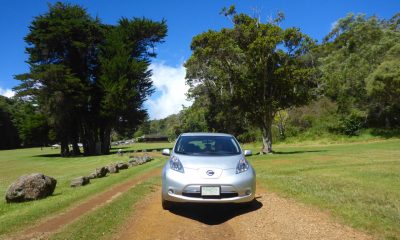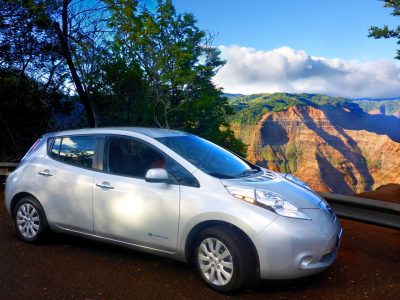 Please come to the County meeting tomorrow, Wednesday, May 9, at 5 p.m. in the Council Chambers at the Historic County Building to testify for the need for an electric charging station at the Tech Center in Waimea, which is owned by the county. If there is enough testimony chances are very high one or more council members will be proposing an amendment to the Mayor’s operating budget
Please come to the County meeting tomorrow, Wednesday, May 9, at 5 p.m. in the Council Chambers at the Historic County Building to testify for the need for an electric charging station at the Tech Center in Waimea, which is owned by the county. If there is enough testimony chances are very high one or more council members will be proposing an amendment to the Mayor’s operating budget
Any owners or supporters of electric cars who could testify as to the need for such a facility at the public hearing on the County Budget next Wednesday, May 9, at 5 p.m. in the Council Chambers at the Historic County Building would be really helpful to the cause. It is always more effective to have people show up in person and testify, but for those who can’t come to the hearing, they can help by submitting email testimony by May 9 ( budget decision-making starts on May 10). Email testimony can be submitted to CouncilTestimony@kauai.gov .
Testimony should be directed at the need for a Westside charging station and how that would help Kaua’i move forward toward a more sustainable land transportation system.
 There will be no amendment on the floor at the time of testimony; that will come later. The testimony should focus on need and opportunity. The public hearing is a chance for members of the public to request that the county budget be a budget that addresses core needs and values of the community and moves us forward toward our vision for the future. It’s where the rubber meets the road. If a community goal is not reflected in the budget, we won’t get there.
There will be no amendment on the floor at the time of testimony; that will come later. The testimony should focus on need and opportunity. The public hearing is a chance for members of the public to request that the county budget be a budget that addresses core needs and values of the community and moves us forward toward our vision for the future. It’s where the rubber meets the road. If a community goal is not reflected in the budget, we won’t get there.
Hope you can come to testify. I know it will really help.
If someone cannot come at 5 p.m. on Wednesday to the public hearing, they can also testify the next day before the county begins decision-making. That will be at 8:30 a.m.
There are sample testimonies as comment to this blogpost, please add more!

May 8, 2018
Dear Kauaʻi County Council Members:
My name is Derek Ichien. I’m writing to you to advocate for a small allocation of funds to install at least one public electric vehicle charging station at the West Kauaʻi Tech and Visitors Center, located at 9565 Kaumaliʻi Highway in Waimea.
In December, Mayor Carvalho, along with other state leaders, pledged on the deck of the Hōkūleʻa voyaging canoe to completely shift Hawaiian ground transportation to renewable fuels by 2045. The meeting underscored the importance of moving away from fossil fuel usage to not only mitigate greenhouse gas emissions and petroleum consumption, but to keep more money from leaving the state economy simply to run its vehicles. When considering that pledge alongside the 2015 mandate to transition the entire electrical sector to renewable sources by 2045, the state is poised to achieve something unprecedented within the United States.
Unfortunately, it is exceedingly difficult to meet such an incredible goal without adequate infrastructure. On Kauaʻi, there are approximately 68 installed charging plugs at 23 locations. Of these, not a single one exists west of Koloa. This poses large problems for both residents and visitors who are interested in purchasing or renting a plug-in electric vehicle (PEV), as there is no fueling infrastructure for 47 miles of heavily traveled road between Koke’e/Polihale and Koloa Town. Trailblazing visitors and residents who have driven PEVs to that side of the island notice the lack of chargers. In a recent review of comments left for privately-rented electric vehicles on Kaua’i, more than 25% mention the scarcity of chargers as being a negative factor in their experience1. Several reviewers specifically mention the West Side as a problem area for PEVs. If visitors and residents do not feel they will be able to fuel their electric vehicles when needed, there is no incentive for them to make the switch from gasoline-powered vehicles. There is a real sense that the lack of infrastructure on the leeward side of the island, left unaddressed, will prove to be a vital bottleneck in moving toward the bright future outlined on the deck of the Hōkūleʻa.
The site at West Kauaʻi Tech and Visitors Center is uniquely ideal for at least one charging station: it’s at the base of the popular Waimea Canyon Drive; in close proximity to Waimea town center; and located on the major thoroughfare, Kaumali’i Highway. There is certainly a cost associated with charger installation; however, there are several ancillary benefits that may prove worth the expense. Placing chargers at the Tech Center may result in an increase in the residency time of people who stop to charge in Waimea, representing an increase in business opportunity for local shops and restaurants2. Increasing the coverage of its EV charging network would help to allay concerns about refueling PEVs east of Koloa and may bolster sales of electric vehicles within the county. An increase in PEVs, in turn, would allow Kauaʻi County to better position itself to meet the goals of the Hōkūleʻa pledge, and further develop its reputation as a clean-energy leader within the state of Hawai’i.
In an age when sustainability and environmental consciousness are at the forefront of society’s mind, Hawai’i has shown that it intends to blaze a trail to renewable energy and transportation for the rest of the world to follow. It is of the utmost importance that Kauaʻi County constantly strives to express its own commitment to this pledge by continuing its push to pursue renewable energy; to champion sustainable resource use; and to make 2045 the year that an entire state cut its ties with petroleum. Though installing charging stations at the Tech Center may seem like a small step, it will be an integral part of the groundwork needed to fully realize that dream.
Thank you very much for your time and the opportunity to present my thoughts.
Sincerely,
Derek Ichien
1 Data sourced from public reviews on Kauaʻi Turo pages. http://www.turo.com
2 Chargepoint, Inc. “Leading Retailer Partners with ChargePoint to Attract and Retain Loyal Customers” https://www.chargepoint.com/files/casestudies/cs-retail.pdf
May 8, 2018
Dear Kauaʻi County Council Members:
Electric vehicle chargers are urgently needed in Waimea, preferably at the county owned West Kauaʻi Tech and Visitors Center.
It would really help with Kauai’s sustainable transportation goals that the mayor pledged to last year and that were just reiterated in the general plan. These goals are very important, as ground transportation contributes significantly to greenhouse gases and these in turn cause global warming, climate change, sea level rise and ocean acidification.
Any electric driving on the west-side requires very careful planning, and no side-trips or flexibility are possible in order not to get stuck without possibility for recharge. As a founding member of the local EV club KauaiEV I drive a 2015 Nissan Leaf, and can not get to Kokee in my car. About 200 other drivers of older electric vehicles on Kauai have the same problem.
The battery of most electric cars produced before 2016 and many more made in 2016 and 2017 can’t hold enough charge to get from the public chargers in Puhi to the Kokee meadow and back. Not everybody who would like to drive electric can afford a new car, and otherwise the smaller batteries are plenty good enough to get around on Kauai.
The only charger in Waimea at the Baptist church was just installed a few weeks ago and is only public charger west of Puhi, the chargers in Poipu are private or hotel owned and not public, only the Hyatt makes exceptions and lets locals use their chargers. The charger in Koloa is privately owned on private property.
I believe many more electric vehicles should be used privately and in the car rental industry – the electricity can be produced right here on the island by the sun, KIUC is adding clean energy to our grid at unprecedented rates, and we rely less on oil imports and less on things shipped to us from off island. In order to encourage this we need to help and build the charging infrastructure.
Thank you for your consideration.
Sincerely,
Sonja Kass